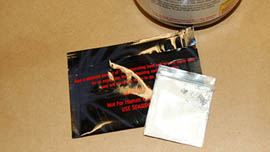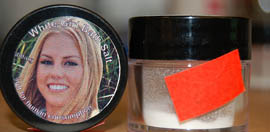Cronkite News has moved to a new home at cronkitenews.azpbs.org. Use this site to search archives from 2011 to May 2015. You can search the new site for current stories.
Senate committee endorses ban on synthetic stimulant ingredients
PHOENIX – Compounds used to make so-called bath salts, synthetic stimulants currently sold by some smoke shops and convenience stores, would be illegal under legislation endorsed Wednesday by a state Senate committee.
Noting that bath salts can cause hallucinations and violent outbursts, Sen. Linda Gray, R-Phoenix, the author of SB 1043, said it’s important for the Legislature to act because use of the substances has increased dramatically since 2010.
“It’s very important that shops cannot legally sell these bath salts,” she said. “The effects of these are destructive.”
Offered as a powder, bath salts are labeled “not for human consumption” and sold under brand names including Ivory Wave, Blue Silk, White Dove or Ocean Burst. People smoke, inhale, swallow or inject the substances to obtain a high similar to that of cocaine.
Gray’s bill would add seven substances used to manufacture bath salts to the state’s list of banned substances. It carries an emergency tag, meaning it requires approval by three-quarters of each house and would become law immediately upon the governor’s signature.
The Public Safety and Human Services Committee unanimously endorsed the bill, sending it to the full Senate by way of the Rules Committee.
Frank LoVecchio, co-medical director the Banner Good Samaritan Poison and Drug Information Center, said center received 274 calls regarding bath salts in 2011 after receiving none in 2010.
“There are some weekends where I took care of four or five cases,” said LoVecchio, who is also an emergency physician for Maricopa Medical Center. “Some of them are remarkably agitated, they couldn’t be controlled and they required three or four police officers to control them. Some were running around naked, some were very combative, some were even driving and some required anesthesia to knock them out.”
Bath salts can cause chest pains, increased blood pressure, a racing heartbeat, high temperature, agitation, paranoia and delusions, according to the Office of National Drug Control Policy. Overdoses can be fatal and are difficult to prevent because the strength of the stimulant can vary by brand and even by batch.
At least 37 states have passed laws to ban or contain the use of bath salts, according to Ramona Sanchez, a spokeswoman for the U.S. Drug Enforcement Agency’s Phoenix office.
“We hope Arizona will jump on that initiative,” she said.
In September, the DEA issued a one-year ban on possessing and selling three chemicals commonly used to produce bath salts, allowing federal officials time to study whether the chemicals should be permanently banned.
In addition, a bill banning ingredients used for bath salts is under consideration by Congress.
Last year, Arizona lawmakers banned substances used to make spice, a treated herb mix that causes effects similar to marijuana.
LoVecchio hopes lawmakers give bath salts the same treatment.
“It’s one thing if someone wants to buy marijuana,” he said. “But the ill effects of that are really a thousand times less than something like this. It doesn’t even compare.”








